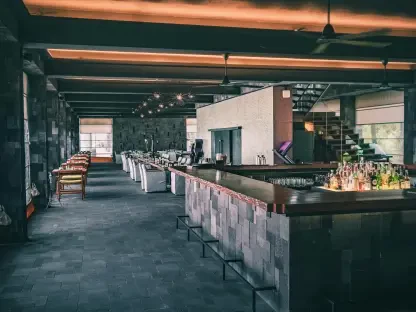The hospitality industry is in the midst of a remarkable transformation, driven by digital innovations and advanced technological integrations. With the advent of new technologies, the sector is experiencing shifts that are fundamentally altering how guests interact with their environment, how businesses operate, and how services are marketed. These advancements are setting new standards for guest experiences and operational efficiency, making it imperative for hospitality businesses to adapt and thrive in this evolving landscape.
Integration of Advanced Technologies
Personalized Guest Services Through Technology
Technology is revolutionizing personalized services in the hospitality industry, allowing businesses to tailor their offerings to individual preferences like never before. By utilizing data analytics and smart technologies, hotels can now predict guest preferences, personalize room settings, and even offer curated experiences based on past interactions. These enhancements not only boost guest satisfaction but also create loyal customers who feel valued and understood. The marriage of data and service manifests in simple gestures like addressing guests by their names to more intricate arrangements like organizing custom itineraries based on the guest’s previous activities.The move towards personalized guest services has not been without its challenges. Investments in sophisticated CRM systems and data security measures are essential to protect sensitive guest information while ensuring the technology is user-friendly for both staff and guests. However, these hurdles are often outweighed by the benefits. Guests now expect a seamless and personalized experience, akin to the tailored content provided by modern streaming services. The ability to provide such bespoke experiences not only helps in retaining customers but also serves as a USP that differentiates a hospitality brand from its competitors, fostering long-term loyalty and positive word-of-mouth.
Streamlined Operations and Efficiency
The adoption of automation and robotics is significantly streamlining operations within hotels and restaurants. Robotic concierges, automated check-in and check-out processes, and smart room controls work seamlessly to reduce wait times and enhance operational efficiency. Such innovations free up staff to provide more personalized service, ensure quicker resolution of guest issues, and ultimately improve overall guest satisfaction and operational smoothness. These technologies enable a smoother operation by handling repetitive and time-consuming tasks, allowing human staff to focus on more value-added services.Operational efficiency is further enhanced by AI-powered monitoring systems that predict maintenance needs before they become issues, thereby reducing downtime and improving the guest experience. Automated inventory management in hotel kitchens ensures that restaurants never run out of essential supplies, reducing waste and controlling costs more effectively. These technologies are indispensable in high-traffic environments where the smallest inefficiencies can lead to significant disruptions. As a result, the hospitality industry is witnessing unprecedented levels of efficiency, which positively impact both the guest experience and the bottom line.
Enhanced Marketing Strategies
Dominance of Social Media
In today’s digital age, a robust social media presence is essential for any hospitality business. Social media platforms are invaluable for engaging with potential and repeat guests, building brand awareness, and collecting feedback. Hotels are leveraging platforms like Instagram and Facebook to showcase their properties, share user-generated content, and engage directly with guests through comments and messaging. This active engagement helps in fostering a closer connection with the audience and understanding their needs better. Effective social media strategies often include the use of high-quality visuals and interactive content, which significantly enhance guest attraction and retention.Social media also offers the advantage of real-time communication, enabling hotels to address queries and concerns promptly. This immediate response capability can significantly boost customer satisfaction and loyalty. Furthermore, social media platforms provide valuable analytics that help businesses gauge the effectiveness of their marketing strategies and adjust them accordingly. By analyzing metrics such as engagement rates and customer feedback, hospitality businesses can continually refine their approach, ensuring they stay relevant and appealing to their target audience. This constant loop of engagement and feedback is a powerful tool for both customer acquisition and retention.
The Power of Email Marketing
Email marketing continues to be a powerful tool in the hospitality sector. Effective email campaigns start from sharing engaging content such as blog posts, behind-the-scenes videos, and curated newsletters to facilitating post-stay follow-ups. Personalized email marketing can include special offers for future stays, exclusive promotions, and pre-arrival upselling opportunities, which not only enhances the guest experience but also drives repeat business. A well-crafted email can evoke nostalgia, invite future bookings, and keep the brand at the forefront of the customer’s mind, essentially serving as a personalized touchpoint between the guest and the hotel.Moreover, email marketing offers a level of personalization that other marketing channels often lack. Through segmentation and targeted messaging, hospitality businesses can tailor their communications to specific guest preferences, habits, and past behavior. This ensures that the content delivered is relevant and valuable to the recipient, thereby increasing the likelihood of conversion. Automated email sequences enable timely interactions at critical points in the customer journey, such as post-booking confirmations, pre-arrival tips, and post-stay thank-you notes. These touchpoints significantly improve the overall guest experience, building a lasting relationship between the guest and the hotel.
Building Loyalty Through Programs
Loyalty programs are essential in understanding guest preferences and fostering a sense of belonging. Modern hospitality businesses are harnessing data collected from loyalty programs to customize services and provide exclusive offers. Personalized recognition through such programs reinforces guest loyalty and encourages repeated patronage, ensuring sustainable growth and a steady stream of returning customers. These programs often feature tiered rewards, which offer increasing benefits the more a guest stays, thus incentivizing frequent visits and enhancing the overall guest experience.Data collected from loyalty programs provides invaluable insights into guest behavior, preferences, and spending patterns. This information allows hospitality businesses to continually refine and improve their offerings. For instance, analyzing which rewards and benefits are most popular with guests can help in tailoring future promotions and packages to meet guest expectations more closely. Furthermore, successful loyalty programs often extend beyond mere discounts and offer unique experiences that create emotional connections with guests. Whether it’s an exclusive event, a special dinner, or behind-the-scenes tours, these additional touches make guests feel uniquely valued and appreciated, fostering long-term loyalty.
Influencer Collaborations
Collaborating with influencers is becoming a staple in contemporary marketing strategies. By aligning with bloggers, vloggers, and social media personalities, hospitality brands can significantly expand their reach and credibility. Influencer marketing leverages the followers’ trust in the influencers to drive brand recognition and bookings, offering authentic endorsements that resonate well with potential guests. These collaborations often feature influencers sharing their personal experiences during their stay, which can have a powerful impact on their audience’s perceptions and decisions.The authenticity that influencers bring to their endorsements often results in higher engagement rates compared to traditional advertising methods. Influencers can showcase a property’s features, amenities, and unique selling points in a relatable and genuine manner, making their audience more likely to consider the property for their own travel plans. Moreover, influencer collaborations often extend beyond social media posts to include videos, blogs, and even live events, providing multiple touchpoints for reaching potential guests. By carefully selecting influencers whose audiences align with their target market, hospitality businesses can maximize the impact of their marketing efforts, driving higher engagement and conversion rates.
Adoption of Cutting-Edge Technologies
Role of Artificial Intelligence
Artificial Intelligence (AI) is at the forefront of transforming the hospitality industry. AI tools analyze large volumes of data to provide actionable insights, refining marketing strategies and enhancing customer service. AI-enabled chatbots offer 24/7 customer support, assisting with bookings, answering queries, and providing personalized recommendations, which improve the overall guest experience and operational efficiency. These chatbots can handle a multitude of tasks that would otherwise require significant human resources, such as making reservations, providing room service, or addressing FAQs, thereby freeing staff to focus on more complex issues.AI’s role extends beyond customer interaction into areas such as dynamic pricing and revenue management. Based on historical data and market trends, AI algorithms can predict demand fluctuations and adjust pricing in real-time to maximize occupancy and revenue. Additionally, AI-driven personalization tools can analyze past guest behavior to tailor marketing messages, offers, and services for individual guests, creating a more personalized and engaging experience. This level of customization not only improves guest satisfaction but also drives repeat business and brand loyalty.
Impact of Internet of Things (IoT)
IoT technology is driving the creation of smart and interconnected environments in hospitality. From smart thermostats adjusting room temperatures based on guest preferences to intelligent lighting systems enhancing comfort, IoT devices ensure a consistently personalized experience. Additionally, IoT applications in maintenance, such as predictive analytics, help in proactive equipment servicing, ensuring uninterrupted high-quality service delivery. Such technologies create a seamless and intuitive environment that adapts to guest needs in real-time, enhancing overall comfort and satisfaction.IoT’s influence extends to energy management and sustainability, areas of growing importance in the hospitality sector. Smart energy management systems can optimize heating, cooling, and lighting based on real-time occupancy data, significantly reducing the property’s carbon footprint and operational costs. Likewise, IoT-enabled water management systems can monitor usage and identify leaks or inefficiencies, contributing to more sustainable operations. By integrating IoT technologies, hospitality businesses can not only enhance guest experiences but also achieve their sustainability goals, appealing to eco-conscious travelers.
Virtual Reality and Augmented Reality Explorations
Virtual Reality (VR) and Augmented Reality (AR) are making waves in the way guests experience hospitality services. VR tours provide immersive pre-arrival experiences, allowing potential guests to explore hotel amenities and room layouts virtually. AR applications, on the other hand, enhance on-site experiences, offering interactive room guides and local attraction information, thereby enriching the overall guest stay. These technologies create a new dimension of engagement, offering guests a more interactive and detailed exploration of what to expect during their stay.Beyond enhancing the guest experience, VR and AR technologies are invaluable tools for hotel staff and management. VR training modules can simulate real-world scenarios, providing staff with hands-on experience in a risk-free environment. This can result in improved service delivery and guest interactions. Additionally, AR applications can assist maintenance staff by providing real-time information on equipment status and troubleshooting steps, thereby increasing operational efficiency. The implementation of VR and AR technologies represents a significant step forward in creating immersive, practical, and highly engaging experiences for both guests and staff.
Benefits of Automation and Robotics
Enhancing Guest Services
Robotics are increasingly performing tasks that enhance guest services, from robotic concierges delivering luggage to automated room service. These innovations reduce human error and ensure prompt service delivery. By employing robots for routine tasks, hospitality staff can focus on more critical aspects of guest service, such as personalized care and complex problem-solving. The presence of robots can also add a novelty factor to the guest experience, creating memorable interactions that guests are likely to share with others, further promoting the property.In high-volume environments like hotels and restaurants, robots can significantly reduce wait times and increase efficiency. For instance, robotic food and beverage servers can ensure that orders are delivered accurately and promptly, enhancing the guest dining experience. Additionally, robots can handle housekeeping tasks such as vacuuming and restocking supplies, which ensures cleanliness and hygiene standards are consistently met. The integration of robotics in guest services not only improves operational efficiency but also elevates the guest experience by providing quicker and more reliable service.
Operational Cost Reduction
Automation and robotics are not only about enhancing service quality but also about reducing operational costs. Automated systems manage energy consumption efficiently, employ predictive maintenance, and minimize waste, leading to cost savings for hospitality businesses. These savings can be reallocated to enhance guest experiences further, creating a sustainable operational model. The efficiency brought by automation translates into lower labor costs and reduced operational downtime, enabling businesses to optimize their resources effectively.Predictive maintenance is another area where automation and robotics deliver significant cost benefits. By continuously monitoring the condition of equipment and systems, automated solutions can predict and address potential issues before they result in costly breakdowns. This proactive approach extends the lifespan of assets and reduces unexpected repair costs. Moreover, automation in inventory management ensures optimal stocking levels, reducing wastage and minimizing the cost of unused or expired items. These operational efficiencies not only drive cost reductions but also contribute to a more streamlined and effective management process, ultimately enhancing the guest experience.
Emphasis on Video Content
Engaging Audiences with Video Marketing
The hospitality industry is undergoing an impressive transformation, largely driven by digital innovation and the integration of advanced technologies. These advancements are prompting pivotal changes in the way guests interact with their surroundings, how businesses manage operations, and the methods by which services are marketed. The arrival of smart technologies such as artificial intelligence, Internet of Things (IoT), and virtual reality is elevating the guest experience to new heights, offering personalized and seamless services that cater to individual preferences.For example, AI-powered chatbots are now commonly used to provide real-time assistance, while IoT devices enhance in-room experiences by allowing guests to control lighting, temperature, and entertainment through their smartphones. Virtual reality is being utilized to offer immersive tours of hotel properties, allowing prospective guests to experience a virtual stay before booking. These innovations are not only enhancing guest satisfaction but also boosting operational efficiency by streamlining processes and reducing costs. In this rapidly evolving landscape, it’s crucial for hospitality businesses to stay ahead by embracing these technological advancements to remain competitive and thrive.









